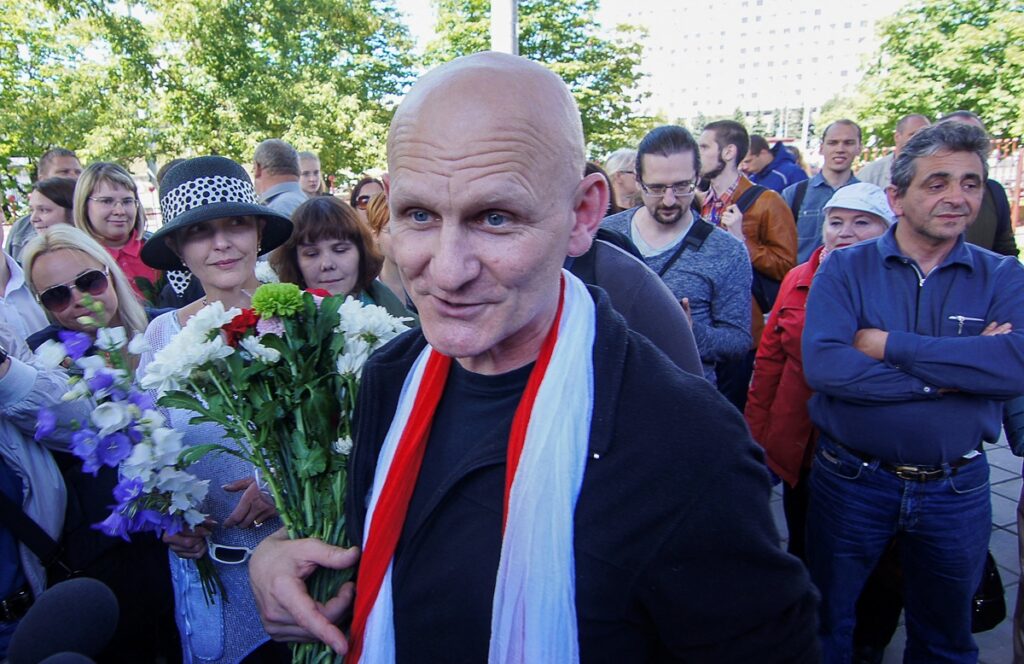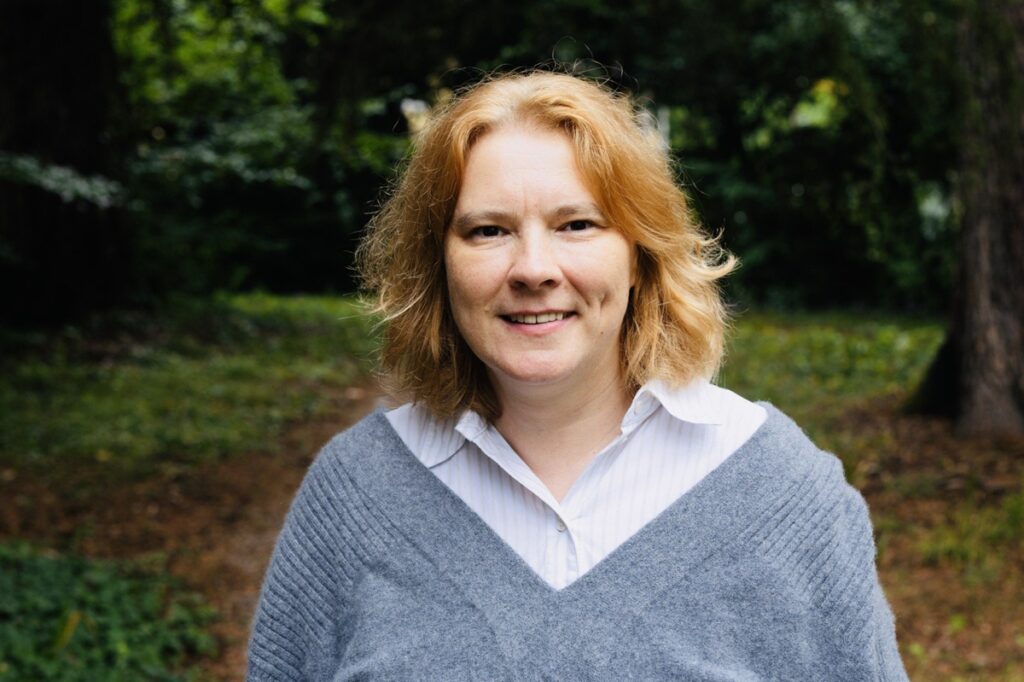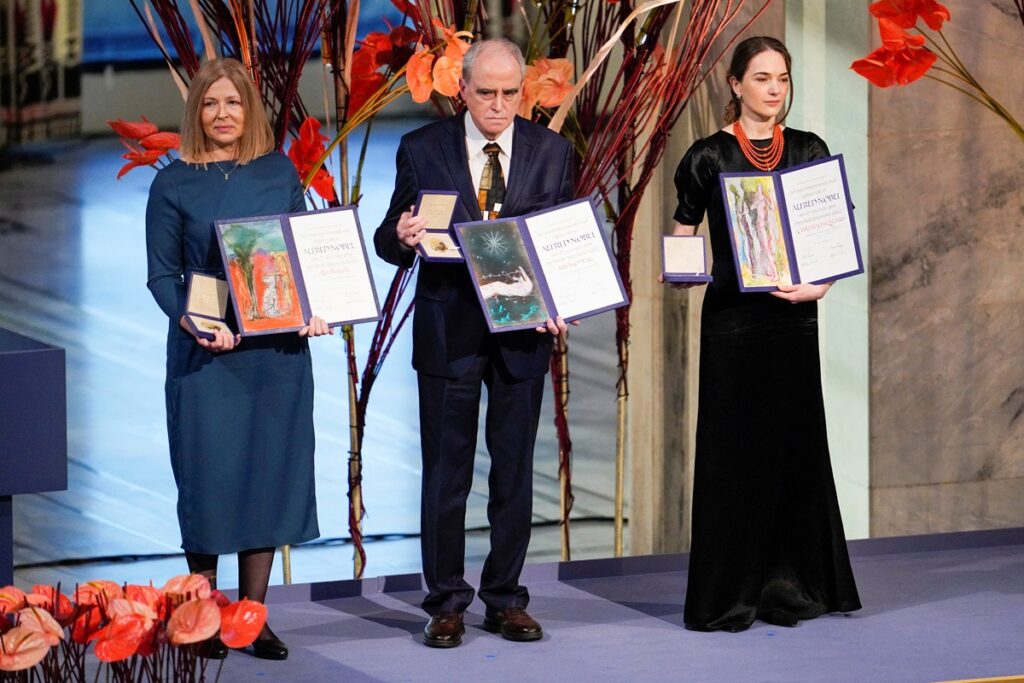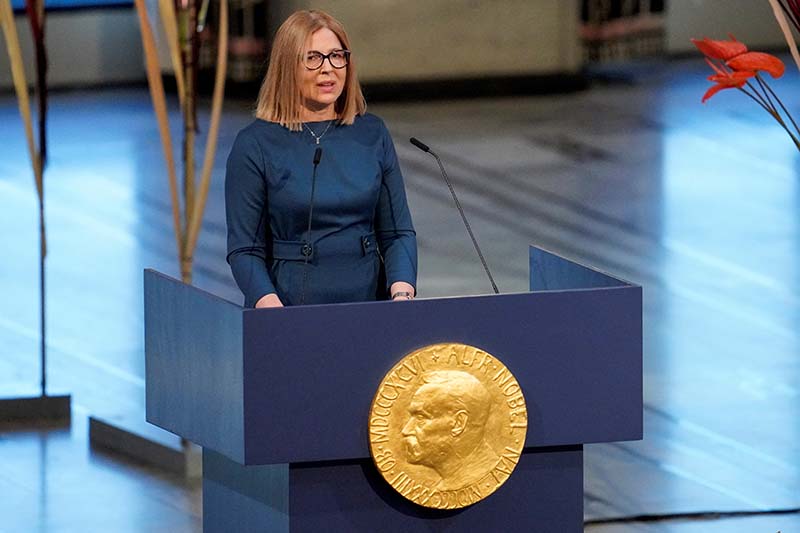(OSV News) — Supporters of a Catholic winner of the Nobel Peace Prize have urged Western church leaders to take up his cause four years after he was detained and jailed in Belarus on trumped-up charges.
“Since our last short meeting in November 2022, I haven’t received any letters or been allowed to speak to him by telephone,” said Natallia Pinchuk, wife of imprisoned Nobel laureate Ales Bialiatski.
“I’d be so grateful if Western Catholics, who aren’t constrained by diplomatic considerations, could help draw attention to his sufferings and pressure their governments to act,” she said.
Deprived of sacraments, spiritual support
The lay Catholic, now exiled in Norway, spoke with OSV News as Bialiatski, a major figure in the church’s post-communist revival, remained in a penal colony, deprived of sacraments and any spiritual support.
He was jailed in June 2021 — without a trial or conviction — in the wake of the massive demonstrations against President Alexander Lukashenko’s dictatorship that broke out after the presidential election in August 2020.

Among many contributions to church life, Bialiatski translated liturgical works into Belarusian, including psalms still used in the Catholic lectionary.
A daily Mass attender, he also chaired the parish council of Minsk’s Holy Trinity Church, which became a hub for Belarusian writers and artists following its reopening in 1991.
Priests not allowed access to prisoners
Pinchuk said Catholic priests were not allowed access to prisoners in Belarus, while the lack of communication made it impossible to ascertain Bialiatski’s medical needs.
Meanwhile, a religious rights campaigner told OSV News she was shocked by how little church attention had been given to the Nobel laureate, who holds numerous other international human rights awards.
“Perhaps the rigor of repression in Belarus has made it difficult to focus on his plight, especially with outside attention drawn to the war in neighboring Ukraine,” said Natallia Vasilevich, coordinator of the ecumenical Christian Vision organization, who holds a doctorate from the University of Bonn in Germany.

“While his high status clearly makes him a priority prisoner, it may also count against his early release. All we know is he still faces a long and harsh sentence, and will be an old man if he ever gets out,” she said.
Supported Belarus independence
Born in 1962 in Russia’s Karelia region, Bialiatski supported Belarus independence from Soviet rule and directed its Viasna Human Rights Center until its supreme court de-legalization in 2003.
He also co-founded the country’s first post-communist Catholic magazine, “Christian Thought,” and the Belarusian Catholic Assembly, which campaigned for the return of confiscated churches and religious holidays.
As a literary expert, he belonged to the Union of Belarusian Writers and the Belarusian PEN Center, chairing a working group of democratic NGOs and serving as vice president of the International Federation for Human Rights.
His numerous awards include the Andrei Sakharov Freedom Prize and U.S. State Department Award, as well as prizes from the Council of Europe’s Parliamentary Assembly and several honorary citizenships.
Awarded Nobel Peace Prize in 2022
In 2022, while in detention, he was awarded the Nobel Peace Prize at his fifth nomination for helping “demonstrate the significance of civil society for peace and democracy.”
In March 2023, however, he was handed a 10-year penal colony sentence for “smuggling by an organized group” and “financing of group actions grossly violating the public order” in a move condemned by United Nations experts as a “targeted use of criminal persecution.”
Hopes for a revision of the lay Catholic’s sentence have risen since the May election of Pope Leo XIV and arrival in July of a new Vatican nuncio, Archbishop Ignazio Ceffalia, appointed by the late Pope Francis in March, as well as the June assignment of a Belarusian ambassador to the Vatican.
‘No public support at all’ from church figures
However, in her OSV News interview, Pinchuk said her jailed husband had received “no public support at all” from any church figure since his original July 2021 arrest — although the Nobel Committee, European Union, European Parliament, Amnesty International and other organizations had all taken up his case.
Meanwhile, religious and human rights advocate Vasilevich said Bialiatski had been “overjoyed” when a previous nuncio, now-Cardinal Claudio Gugerotti, had visited him in prison in 2012 during a previous five-year term for “tax evasion” to convey a blessing from Pope Benedict XVI.
“Belarus’s own bishops are in a difficult situation, with few possibilities to assist political prisoners,” Vasilevich, the Christian Vision coordinator, told OSV News.
Yearning for ‘some new sign’ of church support
“But many people yearn for some new sign of support from the church. Even if talking publicly isn’t the best policy, political prisoners should top the agenda in any discussions between the Holy See and Belarus regime,” she said.
Catholics make up around a 10th of the 9.4 million inhabitants of Belarus, where Lukshenko began a seventh term as president, after 31 years in power, after claiming victory in January elections with 86.8% of votes, despite international sanctions.
Dozens of Catholic, Orthodox and Protestant clergy have faced arrest, including Father Henrykh Akalatovich, an elderly and unwell parish rector from Valozyn, who began 11 years in a strict-regime penal colony in April for “high treason.”
The chairman of the former Soviet republic’s Major Superiors, Delegates and Representatives of Institutes and Societies of Apostolic Life, Oblate Father Andrzej Juchniewicz, was also arrested in mid-2024 for unspecified “subversive activities” and sentenced to 13 years in April after a closed trial when his charge was changed to “criminal offenses” involving sex with minors.
Priests among political prisoners
Although both priests are among 1,198 inmates currently recognized as political prisoners by human rights groups, no mention of their imprisonment has been made on Catholic Church websites in Belarus.
Vasilevich told OSV News that Christian Vision had found no evidence to substantiate the abuse accusations against Father Juchniewicz.
However, she added that the charge gave him “low status” in Belarus’s penal system and made him vulnerable to mistreatment by prison administrators and fellow inmates.
False allegations regarding abuse have often been used as a weapon against Catholic clergy in countries of the former Soviet communist block, experts say.
‘Lukashenko regime does what it likes’
“The fate of both priests, like that of Ales Bialiatski, graphically shows how the Lukashenko regime does what it likes — accusing people at will and giving them long, draconian sentences,” Vasilevich said.
Vasilevich told OSV News Bialiatski had “invested much of his life” in supporting the Catholic Church and remained well known among clergy and laypeople.
Meanwhile, Pinchuk said she had received only occasional news of her husband from released fellow prisoners, adding that she remained hopeful that Pope Leo and Archbishop Ceffalia, the new nuncio, would do something to help those “suffering for their Christian convictions.”

“Prisoners have been released before under Western government and church pressure, and I really hope ordinary Catholics will help ensure more is now done,” Pinchuk, who married Bialiatski in 1987, told OSV News.
‘Embarrassing church has shown so little interest’
“It’s embarrassing and concerning that the church has shown so little interest, and I hope its position may now change.”
Pinchuk traveled to Oslo, Norway, on Dec. 10, 2022, to receive the Nobel Prize on behalf of Bialiatski.
“It is a dramatic mistake to separate human rights from the values of identity and independence,” she said in a speech she delivered on his behalf. “Civil society should have such a degree of independence that it guarantees the safety of a person from abuses of state power.”
She closed the speech with the words of St. John Paul II, “Do not be afraid!” adding she was confident in her belief that “spring always comes after winter.”
Jonathan Luxmoore writes for OSV News from Oxford, England.




